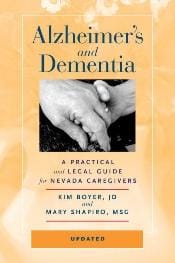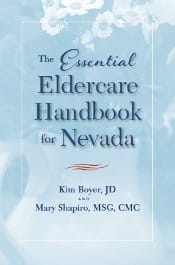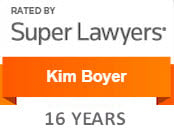Medicaid Division Of Assets In Nevada
By Kim Boyer
Medicaid law is complex and there is a great deal of confusion over the “division of assets” and the “Medicaid spend-down.” Everyone’s situation is different and this article provides an example of just one of the ways in which many of our clients are able to qualify their spouse for Medicaid without spending down. After the example, basic Medicaid rules are discussed.
Case Example: Division of Assets
Barbara and Joseph have been married 18 years. Barbara has Alzheimer’s, and is getting worse. The couple has accumulated $500,000.00 in assets, and they have a home. Joseph says, “I worry about losing everything. I have even thought about getting a divorce. I want to stop worrying. What
can I do?”
Joseph can petition the court to divide the assets equally. By doing this, one-half of the assets or $250,000.00 is set aside to him and will not have to be used to pay the nursing home for Barbara’s care. The couple stays married, and the at-home spouse can stop worrying about losing all the assets.
| Nevada Medicaid Numbers for 2022 | ||
| Income Cap | $2,523.00 | |
| Minimum Monthly Maintenance Needs Allowance (07/01/22-06/30/23) |
$2,288.75 | |
| Maximum Monthly Maintenance Needs Allowance |
$3,435.00 | |
| Minimum Community Spouse Resource Allowance |
$26,480.00 | |
| Maximum Community Spouse Resource Allowance |
$137,400.00 | |
| Penalty Divisor | $9,059.10 | |
Exempt Assets
- Up to $2,000.00.
- Home, up to $636,000.00 in equity, unless spouse or disabled child resides in home. The home must be the principal place of residence.
- Personal belongings and household goods.
- One car or truck.
- Burial spaces and certain related items for applicant and spouse.
- Up to $1,500.00 designated as a burial fund for applicant and spouse.
- Value of life insurance if face value is $1,500.00 or less. If the face value exceeds $1,500.00, the cash surrender value in these policies is countable.
- ABLE Accounts up to $100,000.
Other assets are generally non-exempt, and are countable.
Income Cap
If the applicant’s gross income is over the income cap ($2,532.00), he or she is not eligible for Medicaid, unless a qualified income trust (“QIT”) is created. For married applicants over the income cap, it is often best to obtain a QIT and apply for Medicaid. The at-home spouse can often keep more income and assets.
Asset and Income Rules – Single
A single applicant will qualify for Medicaid as long as he or she has only exempt assets. The income must not be over the income cap, otherwise an income reduction trust is needed. Once eligible, the income of a single applicant will go to the facility as “patient liability” less a $35.00 per month personal needs allowance.
Asset and Income Rules – Married
The at-home spouse can keep exempt assets, plus a certain amount of countable assets called the Community Spouse Resource Allowance (“CSRA”). The CSRA is the maximum monthly maintenance needs allowance, according to a memorandum. The applicant’s income cannot be over the income cap.
Medicaid will also add both spouses’ income and divide by two to determine if the applicant is over the income cap. If over the income cap, an income reduction trust is needed. Once eligible, the at-home spouse can keep all of his or her income and none of it must be used for the care of the spouse. If the at-home spouse’s gross monthly income is less than $2,288.75, then a portion of the institutionalized spouse’s income is given to the at-home spouse up to a total of $2,288.75. This amount can be increased by Court Order to $3,435.00.
The law allows a married person to take planning steps to increase the amount of income and assets he or she can keep when the spouse is facing a nursing home stay. This planning allows the spouse great financial benefit and peace of mind. In addition, the monthly income of the at-home spouse can be increased. Without proper legal advice, many people spend more money than they have to spend.
Spend Down
“Spend down” refers to the process of reducing countable assets to the eligibility level. Some examples are paying off a mortgage, purchasing a better car, or arranging burial. For a married couple, the timing of the spend down may be critical.
Joint Accounts
The entire amount in the bank account is considered as if it belongs to the applicant, unless you can prove that some or all of the money was contributed by the other person who is on the account.
Gifting of Assets
All gifts are subject to a 5-year look-back period. Gifts made outside the 5-year look-back period create no disqualification period. If gifts were made in the 5-year look-back period, Medicaid will not pay for nursing home care during the disqualification period.
The disqualification period is calculated by taking the value of the asset transferred and dividing by the penalty divisor. For example, if the applicant transfers $90,591.00, that is divided by $9,059.10, and results in a 10-month period of ineligibility. Transfers of less than $9,059.10 will create a partial month of ineligibility. The disqualification period begins to run when the applicant moves to the nursing home and is otherwise eligible for Medicaid except for the gift.
Adding a child’s name to the deed on real property is considered a gift and it creates a disqualification period. There are some exceptions to the gifting rules, such as gifts to a disabled person. Another exception is when a child who was residing in the home for at least two years before the date the individual becomes institutionalized and who provided care to the individual which permitted the individual to reside at home rather than in an institution, as determined by the State.
Estate Recovery
Upon the death of the Medicaid recipient, Nevada liens the home up to the extent of benefits paid. Medicaid must lift the lien from the surviving spouse’s home for any bona fide purpose, such as selling the house, refinancing the house, taking a home equity loan or reverse mortgage. For example, if the surviving spouse sells the home after the nursing-home spouse dies, Medicaid must lift the lien and the surviving spouse is entitled to keep the entire proceeds without paying the lien.
Information provided as a service of Kim Boyer, Certified Elder Law Attorney, updated as of 08/17/22. It does not constitute legal advice. For specific questions you should consult a qualified attorney.





